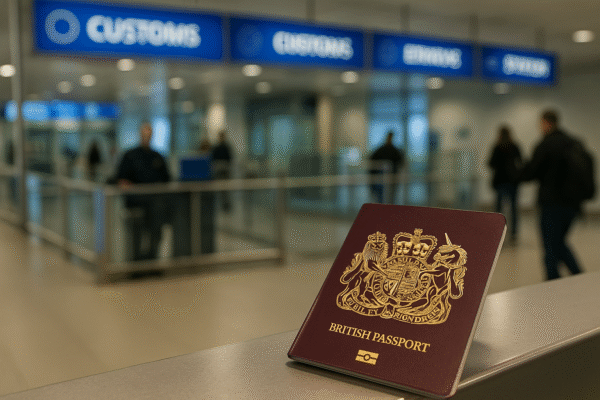British tourists planning to visit Greece, Italy, Hungary, France, Luxembourg, and Germany after October 12, 2025, will face new entry regulations as part of a wider update to the Schengen Area’s travel policies. The UK Foreign, Commonwealth & Development Office (FCDO) has issued a new advisory outlining these changes, which primarily affect passport validity, visa-free stay limits, and documentation requirements.
These updated rules aim to align and streamline border procedures across the Schengen Zone while enhancing border security and reducing overstays. British travelers must now prepare more thoroughly to ensure their travel plans go smoothly under the updated criteria.
Greece: Enhanced Entry Protocols for UK Visitors
Greece remains a top travel destination for British tourists, especially during summer months. Under the new Schengen rules, UK citizens must now ensure:
- Passport Validity: The passport must have been issued within the last 10 years and remain valid for at least 3 months beyond the intended departure date.
- Visa-Free Duration: British nationals can visit Greece for up to 90 days within any 180-day period without a visa.
- Work & Extended Stays: Longer visits or employment will require a work or residency visa, applied for prior to entry.
According to the Hellenic Ministry of Foreign Affairs, overstaying could result in fines or entry bans for up to three years.
Italy: Stricter Passport Rules and Documentation Checks
As one of the most visited countries in Europe, Italy is also implementing these Schengen changes:
- Passport Requirements: UK travelers must carry a passport issued within 10 years and valid for at least 3 months after their planned exit from Italy.
- Visa-Free Access: Up to 90 days of travel is allowed visa-free for tourism, short-term business, or visiting relatives.
- Overstay Risks: Longer stays require formal visa applications, and exceeding the visa-free period can lead to travel bans or fines.
Visit the Italian Ministry of Foreign Affairs portal for additional visa application information and legal stay requirements.
France: Travel Insurance and Entry Stamp Requirements
The French government emphasizes the importance of documentation under the new regulations:
- Passport Validity: Passports older than 10 years or lacking sufficient remaining validity (3 months after leaving France) may lead to denied entry.
- Visa-Free Stay: British citizens may stay in France up to 90 days in any rolling 180-day period without a visa.
- Entry Stamps & Evidence: Entry and exit stamps are crucial for proving your legal stay. If missing, travelers should keep travel tickets or boarding passes.
- Safety Advisory: Given seasonal wildfires, travelers are urged to obtain comprehensive travel insurance and monitor local alerts via the French Civil Protection Agency.
Hungary: Tighter Control for Long-Stay Travelers
Hungary, known for its historic sites and spa culture, has also aligned with the October 2025 Schengen updates:
- Passport Validity: Entry requires a passport issued within the last 10 years and valid for at least 3 months after leaving Hungary.
- 90-Day Rule: UK citizens are allowed a maximum of 90 days’ stay in any 180-day period visa-free.
- Work Permits: Any work or long-term residency requires prior visa approval through Hungary’s immigration services.
Luxembourg: Additional Documentation for Entry
The Luxembourg Ministry of Foreign and European Affairs has confirmed:
- Passport Validity: Same requirements apply—issued within the last 10 years, valid for 3 months post-departure.
- 90-Day Visa-Free Access: British nationals can enter for short-term tourism, study, or business without a visa.
- Proof of Stay: On arrival, travelers may be asked to present hotel bookings, return flights, or evidence of financial means.
Germany: Stamp Requirements and Overstay Penalties
Germany, a major destination for business and leisure travelers, has reinforced the importance of border compliance:
- Valid Passport: Issued within the last 10 years and valid for at least 3 months after departure.
- Visa-Free Entry: Permits up to 90 days of stay in any 180-day span.
- Stamping In and Out: Without official stamps, travelers must show proof of entry and exit. Penalties for overstaying include future Schengen bans.
German authorities advise travelers to carry travel health insurance and sufficient funds for their entire stay.
Key Reminders for UK Travelers
With the Schengen area now enforcing uniform and stricter entry conditions, British travelers are encouraged to:
- Renew passports early if issued before October 1, 2018.
- Track time spent in the Schengen area to avoid overstays.
- Apply for work or residency permits before departure if staying longer than 90 days.
- Carry all necessary documents—such as return tickets, travel insurance, and accommodation confirmations.
Visit the official UK Government Travel Advice portal and respective embassy websites of your destination country for updated and country-specific information.
Conclusion
These Schengen updates, effective from October 12, 2025, affect millions of British tourists and business travelers. With Greece, Italy, Hungary, France, Luxembourg, and Germany implementing the changes, preparing ahead will save travelers from denied entries, unexpected fines, or travel bans.
For a seamless European journey, ensure your passport and plans meet the latest Schengen entry requirements. Start planning now to avoid disruptions and enjoy your travels across Europe safely and legally.
For more travel news like this, keep reading Global Travel Wire






















